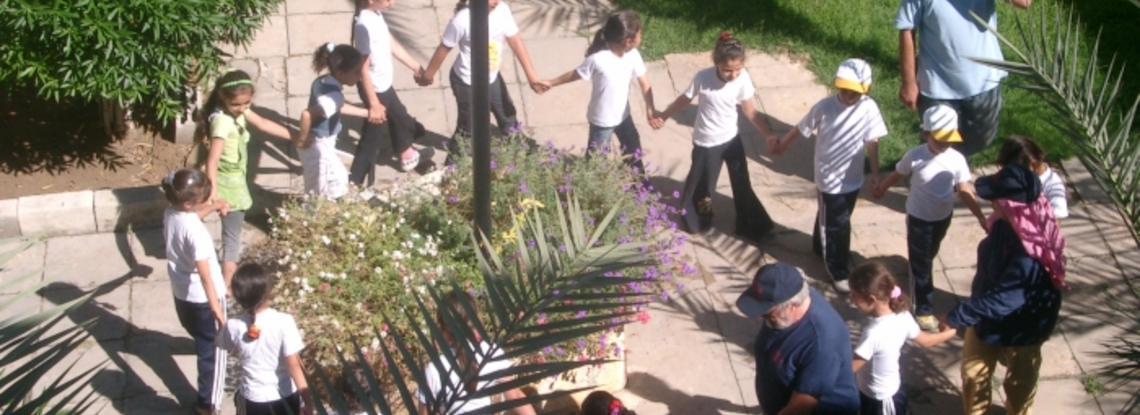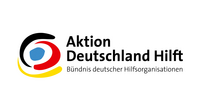Gaza July 2009

Pedagogy on Rubble
Emergency Pedagogy with War-Traumatised Children in Gaza
At the turn of the year 2008/2009 armed conflicts shocked the Gaza Strip. The three-week long fighting costed ca. 1,400 people their lives, including many children. Over 5,500 people were severely injured. 22,000 houses and almost the entire infrastructure of the Gaza Strip were destroyed. Since then 80 percent of the approximately 1.2 million residents have been living under the poverty line set by the UN, over half are children. The Gaza Strip is as before under a blockade. Supplies are delivered mostly though the more than 2,000 illegal tunnels in the border region with Egypt.
The “Friends of Waldorf Education” were already in the Gaza Strip in the end of January for an emergency pedagogy crisis intervention, but their work had to be abandoned early due to the closing of the Egyptian border. It was now possible for a further emergency team made up of ten psychologists, pedagogues, and therapists to travel to Gaza over the Israeli border crossing in Erez with help from the German Federal Foreign Office. They then resumed emergency pedagogy based on Waldorf pedagogy. They picked up their work, where it had to be abandoned in February: in the orphanage of Gaza-City.
Many children in the Gaza Strip are no longer able to leave their apartments due to the severity of their injuries. Others are so heavily traumatised, that they hole themselves up in their apartments and react with panic attacks, when they should leave the house. And still others are simply hidden and locked away by their desperate parents, in succession of their psychopathological changes caused by trauma.
Individual fates confront one everywhere in the Gaza Strip. Even months after the war catastrophe deep emotional wounds gape, especially in the souls of children. About 50% of the over 500 children, with whom the pedagogical emergency team worked, showed clear symptoms of post-traumatic stress disorder.
In a summer camp for children in the heavily damaged city district of Jabaliya the team meets a group of about 60 children. Most show behavioural disturbances. Many try to coerce attention through aggressive disruptions, fight for the stability and orientation offering hand of the carers in circle games or over a shred of modelling wax. Others withdraw from the group with an almost depressive paralysis. With movement exercises in the circle, and attempt is made to work playfully on often recognizable rhythm disorders, lack of concentration, and on movement disorders (hyperactivity or reluctance to move). Because the shock, as the popular saying goes, often sticks in the limbs, every kind of movement which dissolves inner blockades and paralysis is of special importance.
Similar symptoms can also be observed in children and adolescents at the Al Amal Institute and Orphanage in Gaza-City. It is impossible for many to speak about their traumatic experiences. Therefore it is attempted, using music, drawing, painting, sculpting, movement, and role playing games, to provide creative means of expression. These children too need security and orientation giving rituals, in order to counter destruction of boundaries caused by war experiences and to help them to a new awareness of rules. About 20 children participated in a “sleeping beauty game” in deep inwardness. The facial expressions of the children began to slowly ease; their gaze began to open. It was as if a thaw would occur after a psychological ice age with little sun beams.
Also in Salatine, a tent city for the homeless in northern Gaza, word about the work of the emergency team spreads like wildfire. Within a short time, over 120 children and many mothers have come together. Life in the camp is miserable. A charity organises a warm lunch three times a week. In addition to the external misery, comes the internal. Ranin, a nine-year old girl, saw how on the third day of the war a rocket impacted a group of people and killed many of them. She was with her family, fleeing to relatives in Jabaliya. Since then her life has changed dramatically. Nightmares rob her of sleep, she screams every night, she wets herself again, and swings herself aggressively around. “We had houses, now we live in tents. No one cares for us. What can this girl do, that she now must live without hope for a future in a tent!”, Mohammed Zaid, a bombed-out farmer from northern Gaza tells us.
In the rubble of Zeitoun live survivors of the Samouni-Clan, an over 100 person family of rural origin. Most of their homes were destroyed by missile attacks. 36 family members, including many children, died. For four days rescue workers of the Red Crescent were prevented from helping the shaken and injured. Already during the first emergency pedagogy crisis intervention in February 2009, the pedagogical-therapeutic care of the children of the Samouni-Clan was a focus of the work.
The scene is bizarre. In the middle of a huge field of rubble stands a 300m2 large tent constructed by us, which should protect from the glowing sun. Inside, around 120 children walk rhythmically in a circle.
Games from experiential pedagogy and circus pedagogy are on the agenda. Not so far away, an art studio has opened up in a former small storage room. A pressing closeness and hustle and bustle dominate during water-colouring painting and form drawing. Next door in the ruins of a destroyed house, on whose walls blood from the murdered four-year old Ahmet sticks, eurhythmy is being practiced with a group of children. Under the shadow of a small tree in front of one of three still standing houses, kindergarten games are being played with pre-school children. There are dancing, arts-and-crafts, and music-making.
Somewhat farther away in a dugout next to a sick donkey, the 12-year old, severely traumatised Mahmoud is being cared for with emergency pedagogy. “Soldiers in tanks shot at us with smoke. My sister lay injured on the street. Two helicopters circled around her. Many fled. At the gas station laid many dead people. My sister’s son is dead, her husband is dead, and another of my sister’s sons is injured. I dream every night about blood and death. I can no longer concentrate at school!”. Mahmoud has been stricken by especially brutal images.
The work with parents: “I encounter my dead children again and again on the street!”
Trauma is infectious. Children, who have not directly experienced a traumatic event, can be infected by the traumatisation of their parents. One speaks then of a “secondary traumatisation”. The 60 year old mother of seven Mohammadeya El Samouni, reports about trauma caused by the death of two of her children, in connection with parenting problems: “I was with the rest of my family fleeing to Gaza-City and didn’t see my two children dying. I dream repeatedly about my dead children and simply cannot believe that they are dead. I also see them in real life. I encounter my dead children again and again on the street!”
Children often show psychosomatic reactions and behavioural problems as a result of psycho-traumatic experiences. These reactions and behaviours pose a pedagogical challenge to parents and caregivers. “My children always become afraid at night. They cry, scream, and wet the bed. My seven-year old daughter is afraid of everything that moves since the war!” reports the 24 year old Rana Zayed, mother of three children.
This child-raising hardship in dealing with psycho-traumatic symptoms is great and makes parental advising absolutely essential. Therefore the pedagogical emergency team organised well attended office hours for parental advising in Zeitoun and Salatine. In separate men’s and women’s discussion groups, the anxious questions of the parents were received and culturally-sensitive pedagogical solution approaches were sought. Here, the aspects love, attentive care and sense of safety, rhythm and ritualization (daily structure, eating, sleeping), movement and play (ball games, rope games, swinging, circle games), artistic activities (painting, drawing, kneading, arts-and-crafts), physical contact (embrocation, massages), and caring for spiritual-religious feelings played a central role. It was also important to show the parents crisis techniques, which they could use to try to interrupt panic attacks or forced remembering (flashbacks), when they occur in their children. These techniques include breathing exercises and eye movements. These tips are stabilising emergency measures, provided because true professional treatment possibilities are almost entirely absent.
Courses for Pedagogues and Therapists: “This pedagogy strengthens”
At the urgent request of our cooperation partner in the Gaza Strip, the Gaza Community Mental Health Programme, the emergency team of the “Friends of Waldorf Education” staged a four day continuing education course for pedagogues and therapists in the Al Qattan Centre in Gaza-City. The course was excitedly attended by about 100 participants. After the opening ceremony, lectures were held daily about developmental-pedagogical problems in a psycho-traumatic context.
In addition to general questions about psychotraumatology and emergency pedagogy, the courses were above all about child development in the first and second septennial and developmental disorders with respect to traumatic experiences. Practical work groups followed in eurhythmy, painting and form drawing, experiential pedagogy, sand play therapy, and children’s games for pre-school aged children. Daily communal closing circles with rhythmic movement exercises and collective singing rounded off the courses. On the last day, the results of the “workshops” were presented in plenum and the training programme was closed with a question and discussion session. A participant summarised the result of the programme as such: “This pedagogy strengthens!”.
Future Perspectives: “Please return”
In an evaluation discussion on the last work day, a first analysis of the pedagogical emergency mission took place together with the directors of the Gaza Community Mental Health Programme. The director of the psychology department, Hasan Shaban Zeyada thanked the emergency team for their dedicated work with the affected children and parents as well as for the many creative impulses presented in the continuing education courses: “Many experts have already come to Gaza and have passed on theories. But you have convinced us with your practical work. We are exhausted from the continuous trauma work and have become blinded by routine. We need your view from the outside and your creative impulses. Please don’t leave us alone! Please return!”
Bernd Ruf
This is a shorten version of the text. The full report can be read here.


